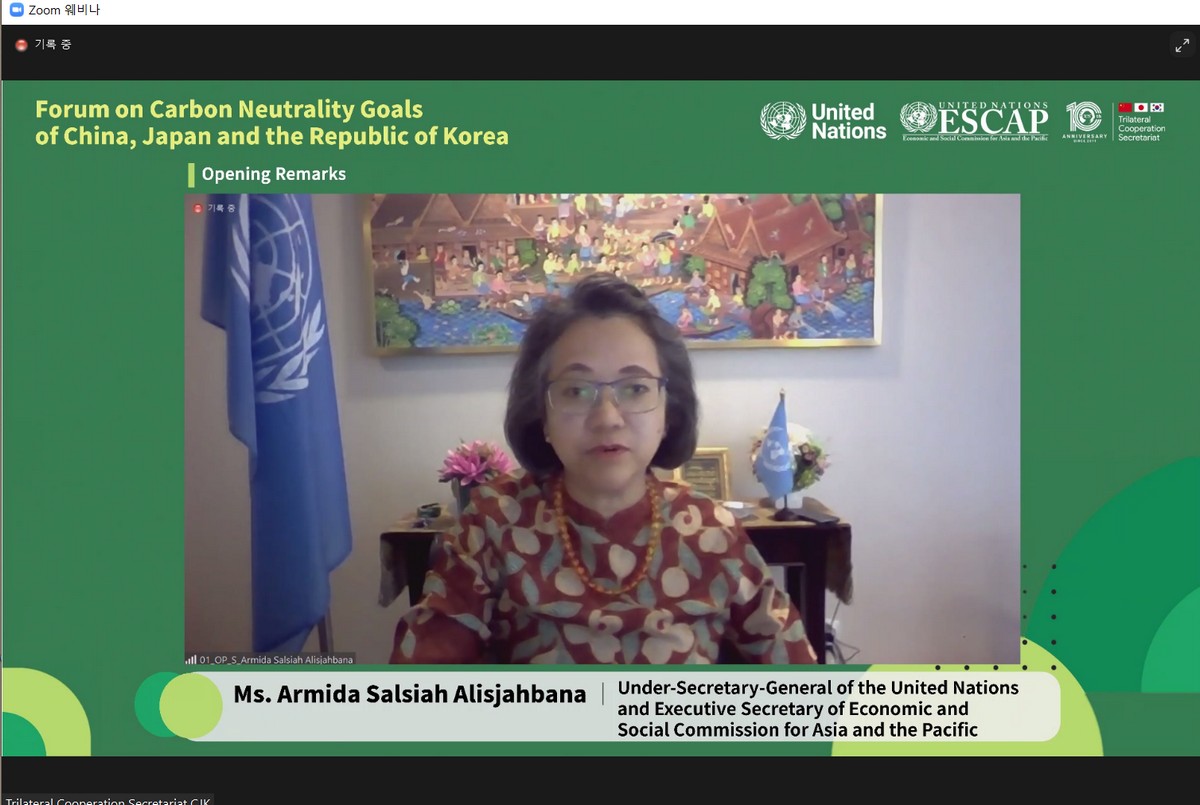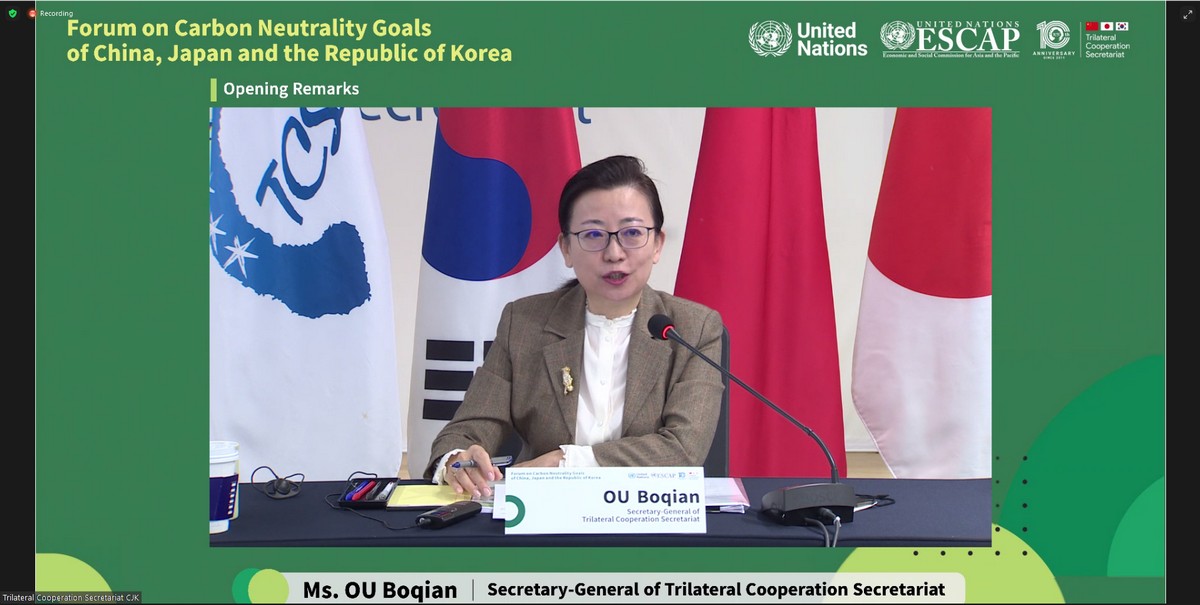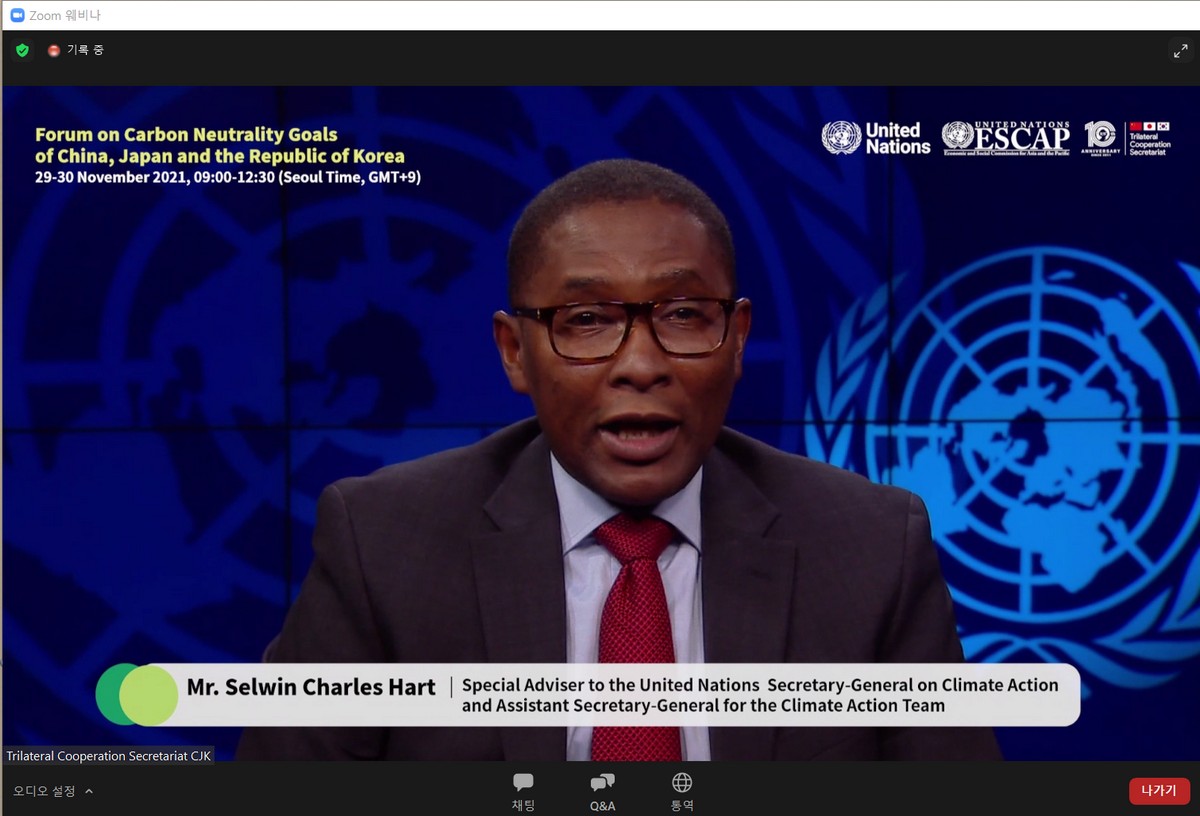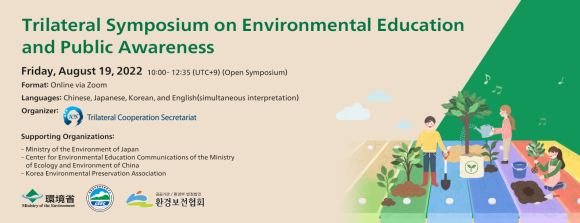Seminar & Forum Forum on Carbon Neutrality Goals of China, Japan and the Republic of Korea affirms the need for trilateral and multilateral cooperation to enhance climate action
2021.11.29
Two weeks after the UN Climate Change Conference (COP26) in Glasgow, the United Nations Economic and Social Commission for Asia and the Pacific (ESCAP), the Climate Action Team at the Executive Office of the Secretary-General of the United Nations (EOSG/CAT), and the Trilateral Cooperation Secretariat (TCS) jointly organized a high-level forum virtually on 29 November 2021, followed by an expert dialogue today led by ESCAP with the support of EOSG/CAT, to create a platform to share policy practices and explore collaboration between China, Japan and the Republic of Korea (ROK) on the carbon neutrality transition.
The Forum is the first of its kind bringing government representatives and experts from lead think tanks and policy advisors from the three countries to delineate the strategic actions and priorities for reaching carbon neutrality, and to exchange views on the challenges faced by the transition in major economic sectors.
Reflecting on the commitments of China, Japan and the ROK to achieve carbon neutrality by 2050/2060 and building upon the outcomes of the COP26, the Forum shed light on the strategies and pathways for achieving net-zero emissions developed by the three countries, and attracted wide interests and tangible ideas on future collaboration among the countries and multilateral cooperation within and beyond North-East Asia.
The Forum included officials from the three governments, and leading experts from national and international organizations to deliberate on the implications of the COP26 outcome on the national climate actions, and identify potential areas and modalities for cooperation between the three countries and with other developing countries.
“The diverse experiences and approaches taken by the three countries will aspire further actions in and beyond the Asia-Pacific region. As major providers of international support in finance, technology, know-how and best practices in Asia-Pacific, the three countries could jointly mobilize regional cooperation for speeding up policy and technology development,” said Ms. Armida Salsiah Alisjahbana, Under-Secretary-General of the United Nations and Executive Secretary of ESCAP.
“As early as in 2010, the ‘Trilateral Cooperation Vision 2020’ adopted by the three leaders acknowledged climate change as one of the top priority cooperation agendas, and guided by the Summit Agreement, unremitting efforts were made by the three governments”, underlined Ms. Ou Boqian, Secretary-General of Trilateral Cooperation Secretariat.
“Together these three countries represent one-quarter of global GDP and one-third of global carbon dioxide emissions. They are also leading innovators of technologies for renewable energy and cleaner industries. As Parties to the Paris Agreement, these three countries have committed to steer their trillion-dollar economies to net-zero,” highlighted Mr. Selwin Charles Hart, Special Adviser to the United Nations Secretary-General on Climate Action and Assistant Secretary-General for the Climate Action Team.
The Forum identified areas for common actions, such as strengthening the roles of the three countries in leading global actions and supporting other countries, collaborating on innovation and application for green and low carbon technologies, and cooperating on the elaboration of strategies and sharing best practices on the transitions and enabling policies. The Forum also expressed the need to build a new platform on carbon neutrality cooperation between China, Japan and the Republic of Korea and to utilize this mechanism to assist other countries in accelerating their energy transition.
The co-conveners of the Forum will bring the key reflections forward in consultation with governments and wider stakeholders to forge trilateral and multilateral cooperation to jointly accelerate transitions to net-zero emissions.



1_XIONG Zhe_Director_National Development and Reform Commission China.pdf
2_SEGAWA Keiko_Deputy Director General_Global Environmental Bureau_ Ministry of the Environment Japan.pdf
3_KIM Hyoeun_Ambassador and Deputy Minister for Climate Change ROK.pdf
4_CHU Jangmin_Senior Fellow_Korea Environment Institute.pdf
5_TAKAMURA Yukari_Professor_Institute for Future Initiatives_The University of Tokyo.pdf
6_TAMURA Kentaro_Program Director_Climate and Energy Area_Institute for Global Environmental Strategies.pdf
7_PARK Hyun Jung_Vice Director_Institute for Climate Change Action.pdf
Program_EN_Forum on Carobn Neutrality Goals.pdf
Documents
- Joint Communiqué of the 25th Tripartite Environment Ministers Meeting Among Korea, China and Japan
- Joint Communiqué of the 24th Tripartite Environment Ministers Meeting Among Japan, Korea and China
- Joint Communiqué of the 23rd Tripartite Environment Ministers Meeting Among Korea, China and Japan
- Joint Communique for the 22nd Tripartite Environment Ministers Meeting Among Korea, China and Japan (TEMM)
- Joint Communique for the 21st Tripartite Environment Ministers Meeting Among Korea, China and Japan (TEMM)
- Joint Communiqué of the 20th Tripartite Environment Ministers Meeting Among Korea, China and Japan (TEMM)
- Joint Communiqué of the 19th Tripartite Environment Ministers Meeting Among Korea, China and Japan
- Joint Communique of the 18th Tripartite Environment Ministers Meeting Among Korea, China and Japan (TEMM)
1_XIONG Zhe_Director_National Development and Reform Commission China.pdf
2_SEGAWA Keiko_Deputy Director General_Global Environmental Bureau_ Ministry of the Environment Japan.pdf
3_KIM Hyoeun_Ambassador and Deputy Minister for Climate Change ROK.pdf
4_CHU Jangmin_Senior Fellow_Korea Environment Institute.pdf
5_TAKAMURA Yukari_Professor_Institute for Future Initiatives_The University of Tokyo.pdf
6_TAMURA Kentaro_Program Director_Climate and Energy Area_Institute for Global Environmental Strategies.pdf
7_PARK Hyun Jung_Vice Director_Institute for Climate Change Action.pdf
Program_EN_Forum on Carobn Neutrality Goals.pdf


